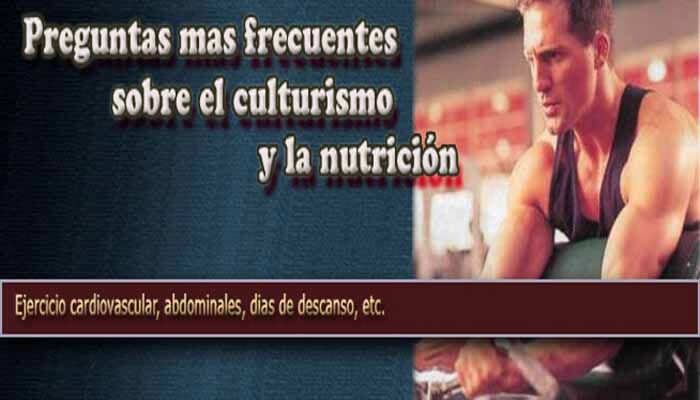1. How long should my training be?
How long your training should last depends on multiple factors. To strengthen and create muscle mass (hypertrophy) a workout can last between 45 minutes and 2 hours, it depends on how many muscle groups we work that day.
- Average rest time between sets can be 1 to 2 minutes in a hypertrophy program, allowing the muscles to re-oxygenate allowing maximum effort in each set.
- If we want to do strength training, we can rest 3-4 minutes per set.
- To burn fat or increase muscular / cardiovascular endurance, there are many effective techniques such as supersets, tri-sets and sets with shorter duration; between 30-45 seconds of rest.

2. Can I do sit-ups every day?
Training your abs every day is a very bad idea. The abs are a thin layer of small muscles that need recovery time just like any other muscle. They are used for many movements and exercises of the body, such as the squat and deadlift, so continually breaking the muscle fibers of these is counterproductive. To get the most out of every workout, train your abs intensely 1-2 times a week like any other muscle group.
3. How often should I do cardio?
It is important to understand the difference between cardio and burning fat, many people confuse the two. Cardio is strengthening the heart muscle (heart). The body burns fat in two ways:
- Long and slow energy costs.
-
High intensity training / cardio interval exercises (sprints, running on the treadmill, stairs etc.) To answer the question posed, cardio every day is the most suitable. Cardiovascular exercise is a workout, and like weight lifting, the muscle breaks down and the body produces cortisol (a hormone that is responsible for converting muscle into an energy source).
4. Cardio before or after weight training?
Cardio should be done on its own as a workout or after your weight training. If you are trying to supplement your nutrition by burning a few extra calories, then any time of the day is good. However, if you do it when you wake up in the morning, you must understand that this training is catabolic since you have to fight against the hormone cortisol, which is produced due to the 7 or 8 hours that you have spent without eating anything. The way you can compensate for this hormone is by taking BCAAs or whey protein to reduce the effects of the hormone.
5. Training or diet, which is the most important?
Neither is more important than the other, but rather they complement each other. Dieting without exercise will leave the body lacking in shape and muscle tone. Exercise without proper nutrition is counterproductive because the body cannot repair itself, the nutrients and elements used have to be replaced. When these elements or nutrients are not replaced, the body will use the muscle tissue and minerals in the bones as a substitute.
6. How do I get a six pack?
A flat stomach or abs are made in the kitchen as I have already mentioned in several articles. Everyone has abs, but what separates a flat stomach from a fat stomach is adipose tissue (belly fat). A proper nutrition plan is the only way to have a strong abs.
7. Why am I not seeing results after several months of training?
There are many possible reasons that would be impossible to determine without proper evaluation, but here is a list of possible reasons:
- Lack of a plan or objective
- Lack of sleep
- Poor nutrition
- Bad training form
- Over-training
8. What are rest days?
Rest days are just that, days to do nothing but eat and allow your mind and body to rest from physical exercise. The mind controls the regulation of hormones in the body, therefore it is essential for the body to have time to recover and regain balance. When the body is constantly worked without rest it can fall into a state of overtraining. This flaw is easily identifiable by:
- Prolonged muscle pain
- Loss of strength
- Tension / muscle aches
- Not gaining muscle is months …

9. Why do bodybuilders use steroids?
I can’t vouch for all athletes, but I can explain what these drugs do and then I’m sure everyone can draw their own conclusions. These drugs are not miraculous, these athletes still have to eat very well, train hard and recover.
Steroids are synthetic hormones of testosterone that accelerate the body’s natural abilities to repair muscle fibers, metabolize food and suppress other hormones that are counterproductive to muscle growth. These are not legal nor are they advised to take due to their side effects and poor information about their use.

